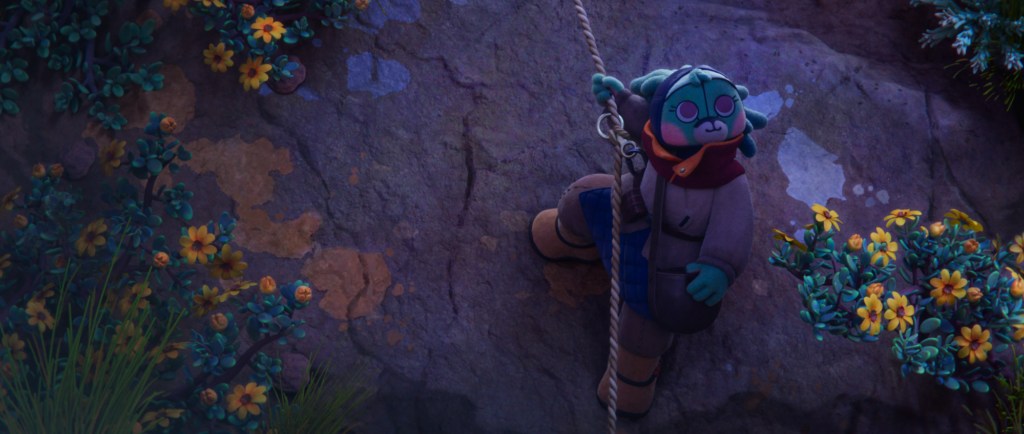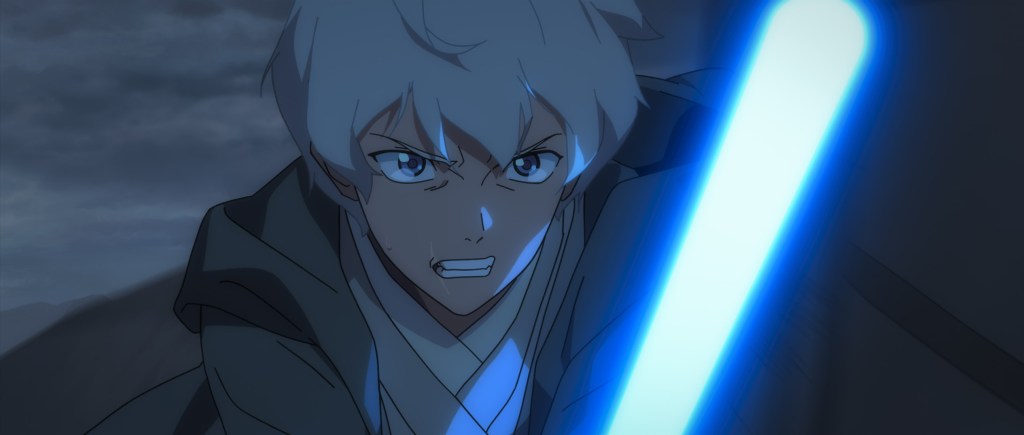Owing in large part to the original trilogy’s circumstances of production, humans in the Star Wars universe have mostly been coded either American or English. Yet that’s hardly a realistic cultural dispersion for a single planet, let alone a Galactic Empire. Even one with the uniformity of fascism. George Lucas borrowed from many cultures and cinematic traditions to create his universe. Star Wars: Visions Season 1 turned the tables just a little by allowing Japanese animation studios to create their own tales within the saga (and reasonable guidelines set by Lucasfilm).
Into a Larger World
Season 2 opens the submissions up even further, with participating studios from Ireland, South Korea, Japan again, India, Spain, Chile, the UK, India, France, and South Africa. The diversity in nationalities also shows in the stories, which vary considerably more than in Season 1. It’s understandable that an animation studio given Star Wars rights for the first time would probably most want to do a lightsaber fight, but all too many of the first batch fit a formula: Wandering Jedi (or Sith) encounters an entrenched Sith (or Jedi) in an unexpected place, and they fight.

Star Wars: Visions Season 2 isn’t without such formulas, but the filmmakers have at least as much interest in Rebels versus Empire, and inter-family conflicts. (Unsurprisingly, perhaps, the Trade Federation and the First Order apparently top nobody’s wish list.) Many bring their own cultures very much to bear. Ireland’s Cartoon Saloon brings its Secret of Kells style to “Screecher’s Reach,” which is basically a banshee-centric ghost story that happens to involve a lightsaber. India’s 88 Pictures’ “The Bandits of Golak,” meanwhile, imagines what Star Wars might look like with a Bollywood aesthetic (sans musical numbers, because this is, after all, a short).
Cultural Balance of the Force
Studio Mir’s “Journey to the Dark Head,” from South Korea, layers Lucas’ fantasy Buddhism with real Buddhism, imagining how a truly impartial observer might see and try to resolve the Jedi-Sith battles, only to conclude it’s not philosophically possible. (Be sure to turn the subtitles on, as it’s the only one not in English.) The very British Aardman Studios score a Denis Lawson Wedge Antilles cameo for “I Am Your Mother,” which focuses on mother-daughter conflict on the racing circuit, and boasts an inventive R2-unit/robot-dog hybrid.

Studio la Cachette’s “The Spy Dancer” uses a style evocative of French comics to imagine what a Moulin Rouge in the Star Wars galaxy might look like, especially if it also served as a secret hub for the Rebellion. Its clientele includes a few plus-sized Stormtroopers, whose armors make entertaining sight gags.
Those that feel less culturally specific experiment with textures and styles. “In the Stars,” from Chile’s Punkrobot, looks at first like Claymation but ultimately sends its Cartoon Network-ready characters into an industrial hell reminiscent of Phil Tippett’s Mad God. “Auu’s Song,” from South Africa’s Triggerfish, makes lead characters that resemble blue, fuzzy teddy bear plushies. “Sith,” from Spain’s El Guiri, may be the best of the bunch, taking us into an intergalactic artist’s loft with Spider-Verse-ish aesthetics, as well as the paint-splash-over-CG-model style of The Unfinished Swan video game, albeit in vivid color.
Luminous Beings, Not This Crude Matter
“The Pit,” made with Lucasfilm and D’art Shtajio, feels more in keeping with standard canon and features star vocal performers in Daveed Diggs and Anika Noni Rose. In doing so, it also brings up a question of connection. So-called Legends canon aside, there is no official Star Wars multiverse, so in most of these cases, our fandom-entrenched minds think of these as existing somewhere in the universe we know and representative of live-action — the “true” Star Wars — rather than part of an animated universe existing entirely in that style.

Is that a weakness on the viewer’s part or the property’s? The current Disney+ shows, which have started to bring major animated characters into live-action, have the side-effect of making animation feel somehow lesser. That’s one thing when the Star Wars cartoons actually do feature lesser actors impersonating better ones, like James Arnold Taylor for Ewan McGregor. It’s another when exciting stylistic flourishes as we see in “Sith” remain tied, however tenuously, to a more matter-of-fact realism.
From a Certain Point of View…
“The Bandits of Golak,” for example, works as a depiction of how Inquisitors and Jedi in current chronology might infiltrate a South-Asian styled planet. But wouldn’t it be even cooler if it were an entirely new take on the whole universe? Like an officially sanctioned “Turkish Star Wars“? If ever there were a need for Star Wars to officially go full multiverse, Visions Season 2 demonstrates it. Disney’s “everything is canon” mandate has been narratively stifling when it comes to spin-offs, and these shorts give a sense of how conceptually and visually stifling it can also be. They’re knocking at the walls; perhaps in further seasons, they can knock ’em down altogether.
In the meantime, yeah, this is a much more fun round of shorts than the first batch.
Grade: 3.5/5
Star Wars: Visions Season 2 debuts May 4th on Disney+.




